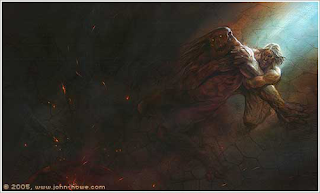 |
| John Howe, Beowulf battles Grendl, john-howe.com |
***
In the immortal words of Rod Serling "picture, if you will," a storyteller silhouetted by the great fireplace of an ancient hall. His audience leans forward with rapt attention as he tells the battle of Beowulf and Grendl. He knows that his listeners have heard the story before and will call him on any deviation from the story as they know it. He also knows that his duty is to pass down the accumulated wisdom of his people. Beowulf's adventures are some of the few mythic tales that have been committed to the written page; other tales were passed down by word-of-mouth exclusively.It's different today. We have books, films, recordings, and even collections of ancient manuscripts. Most of us can read. And we have Twitter, Instagram, and email. Yet storytelling continues, although its form and intent have to a large extent changed. There is literature and recounting personal experience. Not to mention fabrication and corporate spin (see new rhetorics).
Now each of us is a storyteller, or potential storyteller. An article in Time Magazine by James Murdoch discusses our new roles in Storytelling—both fiction and nonfiction, for good and for ill—will continue to define the world. In his article he says,
In 2016 and beyond, those who wish to create a better world will have to make storytelling the center of their efforts, not an afterthought. It’s clear that economic and military might will always be the key levers of statecraft. But more than ever before, swift and dramatic change is being driven by powerful narratives that crisscross the world at the speed of a click or a swipe.
Underlying this change is the empowerment of ordinary people: citizens, mothers, sons, all of us. Once, consumers had limited points of access to information and content, and powerful state and commercial institutions guarded the gates. That time is over.
In 2016, from Lhasa to Tehran to Odessa, people will continue to seek and find forbidden things. In this connected world, the game is up. Censors cannot hide, and their victims have decided, and are empowered, not to take it anymore. Italo Calvino had it right in If on a Winter’s Night a Traveler: “In the decree that forbids reading there will be still read something of the truth that we would wish never to be read.”
-- Marge

No comments:
Post a Comment